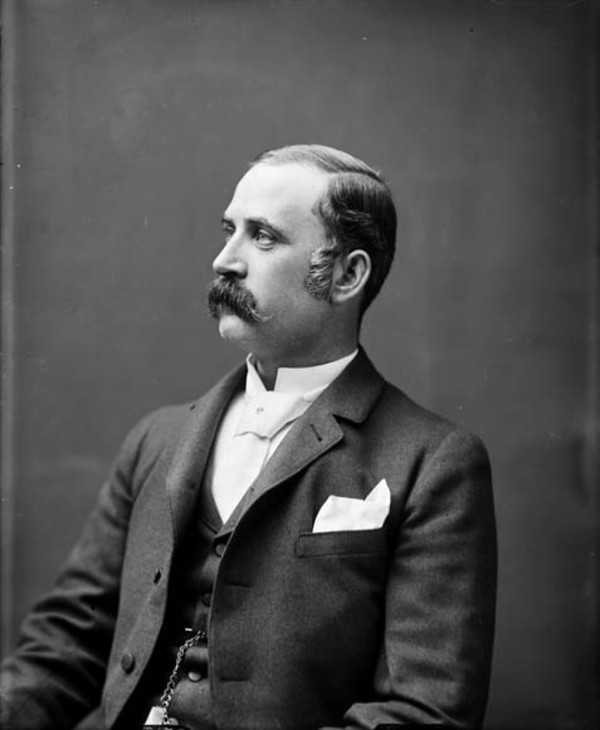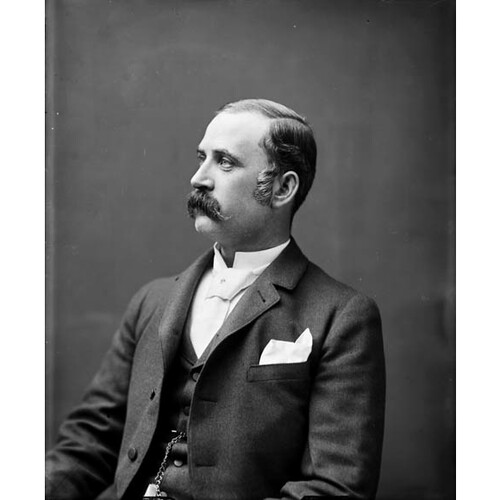McINERNEY, GEORGE VALENTINE, lawyer, politician, editor, and author; b. 14 Feb. 1857 in Kingston (Rexton), N.B., son of Owen McInerney, later a member of the Legislative Council of New Brunswick, and Mary McAuley; m. 12 Sept. 1882, in Richibucto, N.B., Christina O’Leary, daughter of Henry O’Leary*, and they had ten children; d. 12 Jan. 1908 in Saint John, N.B.
After a grammar-school education, George Valentine McInerney entered the College of St Joseph in Memramcook, N.B. Having obtained a ba in French literature and Latin in 1875, he moved on to the Université Laval at Quebec, where he took courses in Roman law and philosophy in 1875–76. He completed his studies at the law school of Boston University, from which he received an llb with high honours in 1878, and at Harvard University. The College of St Joseph placed great stress on the art of public speaking, and at some point McInerney attended Charles Wesley Emerson’s school of oratory in Boston. He would be noted throughout his career for his oratorical skills.
Admitted to the Supreme Court of New Brunswick as an attorney on 23 June 1879, McInerney was called to the bar on 24 June 1880. He became a criminal lawyer in Richibucto and, according to a contemporary, came to enjoy “a very extensive nisi prius connection”; he would be created qc in 1894. From 1880 to 1900 he was secretary-treasurer of Kent County. The following year he moved to Saint John. There he maintained his successful practice, yet found time to lecture on Roman law and real property to students at the Saint John Law School (now the University of New Brunswick faculty of law).
In the federal election of 1878 McInerney had stood as an independent candidate in Kent. He was defeated by Gilbert-Anselme Girouard* on this occasion, and again in 1882. In two subsequent elections, he lost to Pierre-Amand Landry*. Defeated once more in 1890, he was at last victorious, as an independent Conservative, at a by-election in 1892. His nomination papers show that by this time he had acquired widespread support from among both anglophones and francophones. Standing against him were two Acadians, one of whom appealed to his compatriots to vote only for an Acadian, but McInerney successfully resisted “this attempt to raise a race cry.” “Though men may speak around their firesides in different tongues, or may kneel at different shrines to worship . . . ,” he said, “in heart, as in name, we are all one.” The results of the election excited much comment in the press, for in helping to elect McInerney the Acadians of Kent County had deprived New Brunswick of a single Acadian representative in parliament. In Kent, the St. John Daily Sun concluded, “race feeling is a less important element than other considerations.”
In the House of Commons McInerney, a forceful speaker, impressed his fellow mps with his clarity of argument, charming use of illustration, and lucid, elegant language. He was returned again in 1896, when he was also elected to the advisory board of the Liberal-Conservative Association of Canada, but he was defeated in 1900 and 1904. He made two unsuccessful bids for a seat in the provincial House of Assembly as well, in 1890 and 1903.
Two outstanding features of McInerney’s character were his deep Catholic faith and his devotion to his Irish heritage. He worked tirelessly to establish and nurture Catholic and Irish organizations in Saint John. A valuable member of the Holy Name Society, founded in 1901, he became chancellor of the Saint John branch of the Knights of Columbus when it was launched in 1904. In 1905 and 1906 he accepted the presidency of the Irish Literary and Benevolent Society, and he served as grand trustee of the Catholic Mutual Benefit Association. In 1902–3 he had acted as co-editor of the struggling Catholic newspaper, the Freeman. He would continue as a trustee of the paper until his death. To encourage circulation he agreed to produce a series of sketches of Canadian politicians. Ill health allowed him to complete only two, those of Sir John A. Macdonald* (4 March 1905) and Sir Wilfrid Laurier* (18 March 1905). In these sketches, as in his public speeches, he stressed the virtues of patriotism and promoted the concept of imperial federation.
McInerney was sought after as a speaker. Possessing the rare combination of a philosophical mind and a rhetorical temperament bolstered by training in the classics, he produced speeches in an academic style that often drew upon history and literature for adornment. Although ill at the time of his last public speech, in Montreal in 1907, he quieted a restless crowd with his oratorical powers and left a deep impression on those assembled. He had early shown literary skills, especially in poetry. His best-known poem is “Sweet bells of Aldouane,” written in Rexton in 1907 when he was trying to recuperate from his illness. He died in Saint John the following year.
[Some details of McInerney’s life were obtained from the author’s interview with H. J. McInerney of Saint John, N.B., a lawyer and judge, and a grandson of the subject. McInerney’s “Sweet bells of Aldouane” appears in the New Freeman (Saint John), 1 Feb. 1908, and in another grandson’s memoir, [Owen McInerney], My Canadian diary ([Montreal, 1948]), 126–27. A copy of the poem is also found in N.B. Museum, McInerney family cb. k.w.]
N.B. Museum, McInerney family cb, H. O. McInerney, “One of the noted sons of Kent Co. – George Valentine McInerney” (1915). PANB, MC 1156, II: 153–54; RS71, 1908, G. V. McInerney. Freeman, 6 Jan. 1900–27 Dec. 1902. Le Moniteur acadien, 2–13 déc. 1892. New Freeman (Saint John), 3 Jan. 1903–18 Jan. 1908. Review (Richibucto, N.B.), 1, 15 Dec. 1892; 12 Jan. 1893. St. John Daily Sun, 7 Dec. 1892, 13 Jan. 1908. Saint John Globe, 14 Jan. 1908. Can., House of Commons, Debates, 1893–98. Canadian men and women of the time (Morgan; 1898). New Brunswick Reports (Fredericton and Saint John), 36 (1902–4). A. E. O’Leary, Rambles thro’ memory lane with characters I knew ([Richibucto], 1937). SCR, vol.35.
Cite This Article
Kathryn Wilson, “McINERNEY, GEORGE VALENTINE,” in Dictionary of Canadian Biography, vol. 13, University of Toronto/Université Laval, 2003–, accessed March 1, 2026, https://www.biographi.ca/en/bio/mcinerney_george_valentine_13E.html.
The citation above shows the format for footnotes and endnotes according to the Chicago manual of style (16th edition). Information to be used in other citation formats:
| Permalink: | https://www.biographi.ca/en/bio/mcinerney_george_valentine_13E.html |
| Author of Article: | Kathryn Wilson |
| Title of Article: | McINERNEY, GEORGE VALENTINE |
| Publication Name: | Dictionary of Canadian Biography, vol. 13 |
| Publisher: | University of Toronto/Université Laval |
| Year of publication: | 1994 |
| Year of revision: | 1994 |
| Access Date: | March 1, 2026 |




